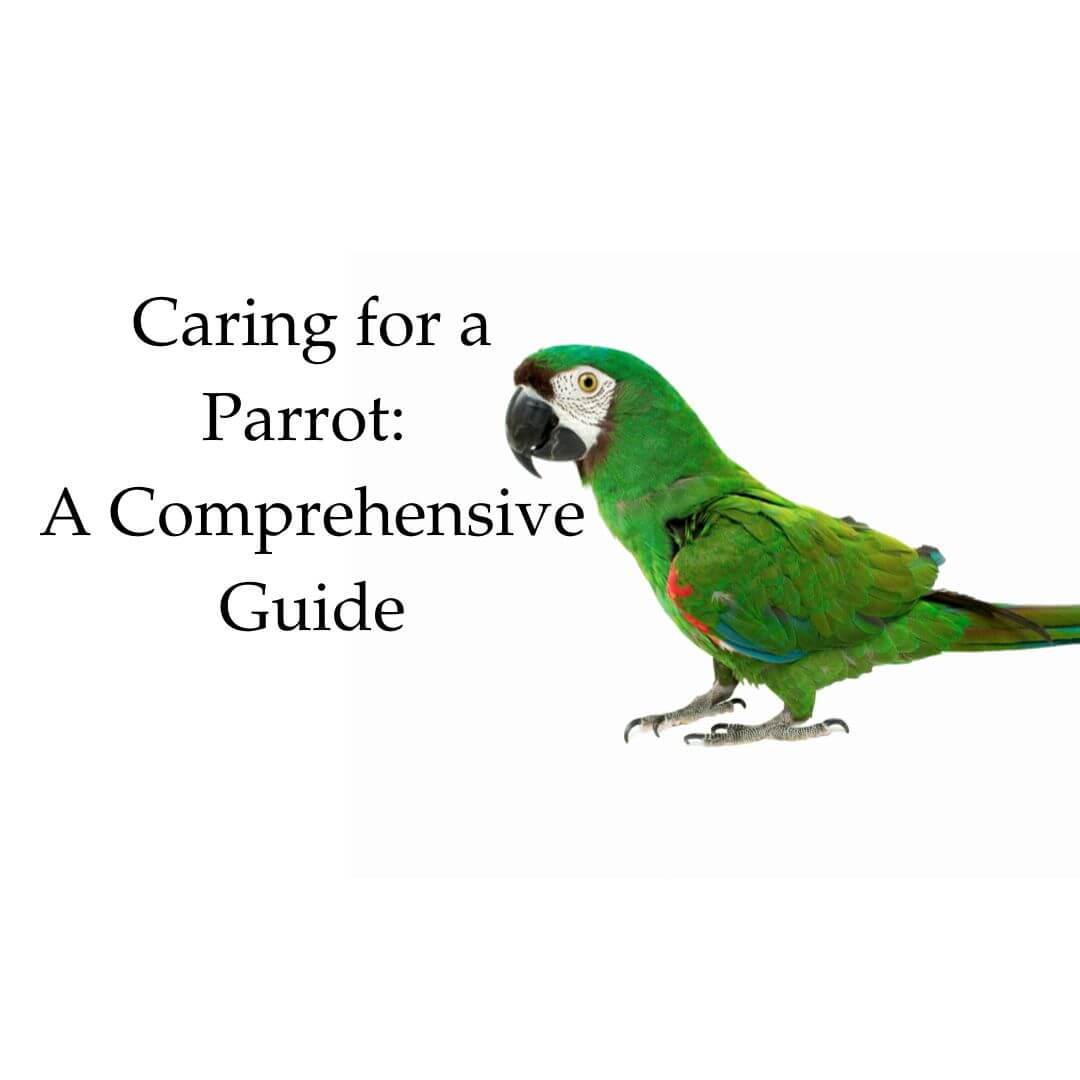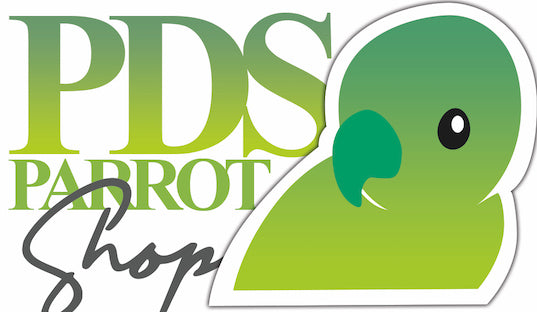
Caring for a Parrot: A Comprehensive Guide
Share
Parrots are intelligent, social, and highly active birds that require a well-rounded care routine to thrive. Caring for a parrot includes the right environment, nutrition, and enrichment, is crucial for their health and happiness. In this guide, we’ll cover essential aspects of parrot care, including cage size, diet, toys, time outside the cage, socializing, and foraging.

1. Choosing the Right Cage
A parrot’s cage is their home and safe space, so selecting the right size and design is critical. The cage should be:
-
Spacious: The larger, the better. A parrot should be able to fully extend its wings and move around freely. For medium to large parrots, the minimum size should allow at least twice their wingspan in width.
-
Bar Spacing: Ensure appropriate bar spacing to prevent injury or escape (e.g., ½ inch for small birds, up to 1 inch for larger parrots).
-
Multiple Perches: Provide a variety of perch sizes and textures to promote foot health. Opt for natural wood perches to help keep nails trimmed and provide a comfortable grip. Avoid Dowels.
-
Easy to Clean: A cage with a removable tray and stainless steel food bowls is ideal for hygiene.

2. Proper Fresh Foods for a Healthy Diet
Parrots require a balanced diet consisting of fresh foods, seeds, and pellets. A diet rich in natural, whole foods helps prevent deficiencies and supports long-term health. Include:
-
Vegetables: Dark leafy greens, bell peppers, carrots, and sweet potatoes.
-
Fruits: Berries, apples, pomegranates, and citrus in moderation.
-
Healthy Grains: Quinoa, brown rice, and sprouted grains.
-
Nuts and Seeds: Almonds, walnuts, flax, and hemp seeds (offered in moderation).
-
Avoid: Avocado, chocolate, caffeine, and high-fat, sugary foods.
For a deeper dive into fresh food and parrot nutrition, check out our book, The Science of Avian Nutrition: https://a.co/d/atMgAEA
3. Importance of Toys and Enrichment
Parrots are intelligent and need mental stimulation to prevent boredom and behavioral issues. Toys should be:
-
Varied: Rotate different types (wood, shreddable, foraging, interactive) to keep them engaged.
-
Safe: Ensure non-toxic materials, no sharp edges, and bird-safe dyes.
-
Foraging-Based: Encourage problem-solving with hidden treats in foraging toys.
Explore our collection of bird toys: www.pdsparrotshop.com
4. Time Outside the Cage
Parrots need ample time outside their cage to exercise and explore. Aim for:
-
At Least 3-4 Hours Daily: Larger parrots may require even more time.
-
Supervised Free Flight or Play Area: Ensure the environment is safe from hazards like ceiling fans, toxic plants, and open windows.
-
Training Sessions: Work on recall and basic commands to reinforce trust and safety.
5. Socializing and Bonding
Parrots are highly social creatures and require interaction to remain emotionally healthy. Ways to socialize your bird include:
-
Daily Interaction: Talk, sing, or simply spend time near them.
-
Training & Trick Learning: Engaging in positive reinforcement training strengthens bonds and stimulates their intelligence.
-
Introducing New Experiences: Take them on safe outings in a travel carrier or harness for enrichment.
6. Foraging Activities
Foraging mimics natural feeding behaviors and prevents boredom. Introduce:
-
Hidden Treats: Wrap food in paper or place inside foraging toys.
-
DIY Foraging Ideas: Use egg cartons, cardboard boxes, or shredded paper.
-
Foraging Trees or Play Stands: Hang fresh veggies or nuts for them to retrieve.
Discover DIY foraging bird toy ideas here: DIY Foraging Bird Toys

7. Cleaning and Hygiene
Regular cleaning is essential to maintain hygiene and prevent illness. Ensure you:
-
Clean the Cage Regularly: Wipe down surfaces and remove waste daily.
-
Wash Food and Water Containers: Clean dishes with hot water and bird-safe soap.
-
Change Ground Covering Frequently: Replace paper or bedding to avoid bacterial buildup.
Learn how to clean bird toys safely and effectively to protect your parrot from harmful bacteria and toxins.
8. Routine for a Sense of Security
Parrots thrive on routine, as it gives them a sense of security and predictability. Try to:
-
Feed Them at Consistent Times: Helps with digestion and reduces anxiety.
-
Maintain a Sleep Schedule: Parrots need 10-12 hours of uninterrupted sleep.
-
Keep Play and Socialization Times Regular: Encourages trust and mental well-being.
9. Positive Reinforcement and Training
Using positive reinforcement is the best way to encourage desired behaviors in parrots. This includes:
-
Rewarding Good Behavior: Use treats, praise, or toys to reinforce positive actions.
-
Avoiding Punishment: Yelling or physical punishment can cause fear and break trust.
-
Redirecting Undesirable Behavior: Offer alternatives rather than scolding.
10. Regular Veterinary Checkups
Annual checkups with an avian vet are essential to detect health issues early. Signs of illness include:
-
Changes in droppings
-
Lethargy or puffed-up feathers
-
Loss of appetite
-
Discharge from eyes or nose
Download your parrot vet checklist here: Vet Checklist
11. Maintaining a Safe Environment
-
Non-Toxic Cleaning Products: Use bird-safe disinfectants.
-
No Teflon or Nonstick Cookware: Fumes are deadly to birds.
-
Avoid Scented Candles and Air Fresheners: Can cause respiratory issues.
Discover the hidden dangers of toxic respiration hazards for pet birds.
12. Carrier Cage for Easy Travel
Having a designated carrier cage is essential for safe and stress-free travel. Choose a:
-
Sturdy and Well-Ventilated Carrier: Ensures comfort and airflow.
-
Secure Door and Locking Mechanism: Prevents accidental escapes.
-
Familiar Setup: Place a small perch or a favorite toy inside for comfort.
-
Used for Vet Visits and Trips: Helps the parrot feel secure during transport.
13. Bathing and Grooming
Parrots require regular bathing to keep their feathers clean and skin hydrated. Some birds love water, while others may need encouragement. Options include:
-
Misting: Lightly mist your parrot with lukewarm water using a spray bottle.
-
Shallow Water Dish: Provide a shallow dish for them to bathe in at their own pace.
-
Shower Perches: Some parrots enjoy showering with their owners using a bird-safe shower perch.
-
Avoid Soaps and Chemicals: Only use clean water, as soaps can strip natural oils.
Nail trimming and beak maintenance are also important:
-
Nail Trimming: Trim them as needed. Avoid rough/sanded perches.
-
Beak Health: Offer chew toys and natural wood to help keep the beak in shape.
-
Professional Grooming: If necessary, seek an avian vet or experienced groomer for trims.

14. Cage Placement
Where you place your parrot’s cage is just as important as its size. Consider the following:
-
Avoid the Kitchen and Laundry Areas: Fumes from cooking, nonstick cookware, and cleaning chemicals can be toxic to birds.
-
Stable Temperatures: Keep the cage away from direct sunlight, drafts, and air conditioning vents.
-
Humidity Levels: Parrots thrive in a humid environment, which helps maintain healthy skin and feathers. Using a humidifier can be beneficial, especially in dry climates.
15. Emergency Preparedness
Unexpected situations can arise, so having a plan in place is crucial. Prepare by:
-
Keeping an Emergency Kit: Include food, bottled water, a first-aid kit, a travel carrier, and extra perches.
-
Fire and Evacuation Plans: Know your exit routes and have a transport plan for your parrot.
-
Smoke Protection: Use an air purifier and have a plan to move your bird to a safe area if needed.
-
Emergency Contact List: Keep your avian vet’s number, local animal shelters, and emergency services handy.
Download your Evacuation Plan Checklist here: Evacuation Plan
By providing proper care, enrichment, and love, you ensure your parrot leads a happy and fulfilling life. Understanding their needs and meeting them consistently will result in a strong, trusting bond with your feathered companion.
Author: Monika Sangar
Co-founder of Prego Dalliance Sanctuary, Artisan of PDS Parrot Shop
Monika Sangar is a parrot rescuer, bird food chef, and toy designer with over a decade of experience in avian care and nutrition. She is the founder of Prego Dalliance Sanctuary and the author of The Science of Avian Nutrition, a cookbook dedicated to fresh, healthy meals for parrots. Explore more bird care tips and bird toys at PDS Parrot Shop!

